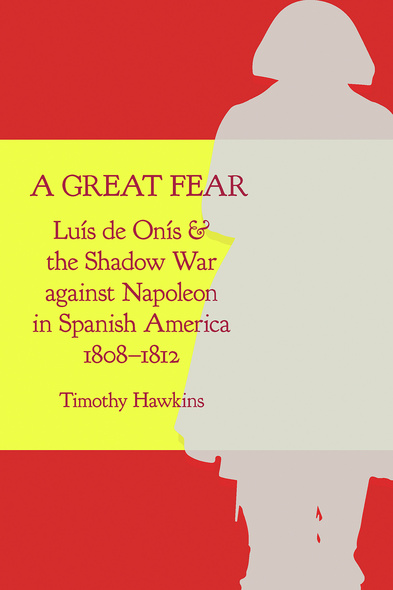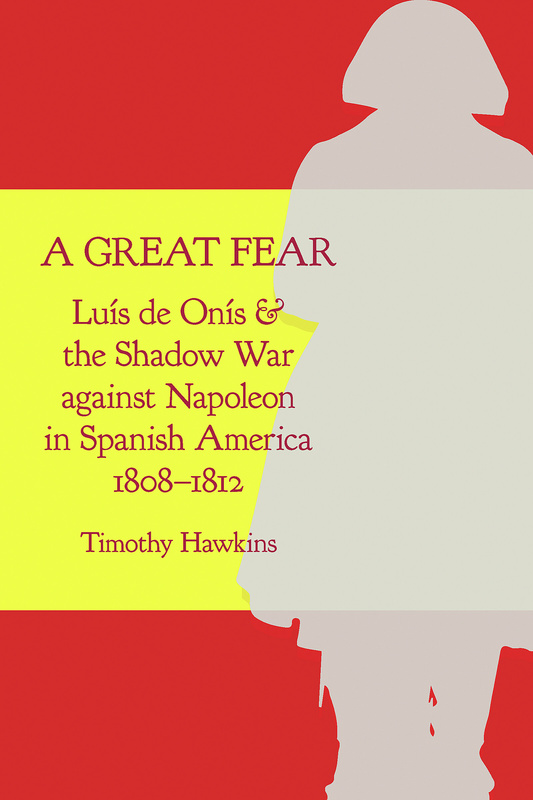
256 pages, 6 x 9
2 B&W figures - 5 maps
Hardcover
Release Date:08 Jan 2019
ISBN:9780817320041
A Great Fear
Luís de Onís and the Shadow War against Napoleon in Spanish America, 1808–1812
SERIES:
Atlantic Crossings
University of Alabama Press
An exploration of the Spanish colonial reaction to the threat of Napoleonic subversion
A Great Fear: Luís de Onís and the Shadow War against Napoleon in Spanish America, 1808–1812 explores why Spanish Americans did not take the opportunity to seize independence in this critical period when Spain was overrun by French armies and, arguably, in its weakest state. In the first years after his appointment as Spanish ambassador to the United States, Luís de Onís claimed the heavy responsibility of defending Spanish America from the wave of French spies, subversives, and soldiers whom he believed Napoleon was sending across the Atlantic to undermine the empire.
As a leading representative of Spain’s loyalist government in the Americas, Onís played a central role in identifying, framing, and developing what soon became a coordinated response from the colonial bureaucracy to this perceived threat. This crusade had important short-term consequences for the empire. Since it paralleled the emergence of embryonic independence movements against Spanish rule, colonial officials immediately conflated these dangers and attributed anti-Spanish sentiment to foreign conspiracies.
Little direct evidence of Napoleon’s efforts at subversion in Spanish America exists. However, on the basis of prodigious research, Hawkins asserts that the fear of French intervention mattered far more than the reality. Reinforced by detailed warnings from Ambassador Onís, who found the United States to be the staging ground for many of the French emissaries, colonial officials and their subjects became convinced that Napoleon posed a real threat. The official reaction to the threat of French intervention increasingly led Spanish authorities to view their subjects with suspicion, as potential enemies rather than allies in the struggle to preserve the empire. In the long term, this climate of fear eroded the legitimacy of the Spanish Crown among Spanish Americans, a process that contributed to the unraveling of the empire by the 1820s.
This study draws on documents and official records from both sides of the Hispanic Atlantic, with extensive research conducted in Spain, Guatemala, Argentina, and the United States. Overall, it is a provocative interpretation of the repercussions of Napoleonic intrigue and espionage in the New World and a stellar examination of late Spanish colonialism in the Americas.
A Great Fear: Luís de Onís and the Shadow War against Napoleon in Spanish America, 1808–1812 explores why Spanish Americans did not take the opportunity to seize independence in this critical period when Spain was overrun by French armies and, arguably, in its weakest state. In the first years after his appointment as Spanish ambassador to the United States, Luís de Onís claimed the heavy responsibility of defending Spanish America from the wave of French spies, subversives, and soldiers whom he believed Napoleon was sending across the Atlantic to undermine the empire.
As a leading representative of Spain’s loyalist government in the Americas, Onís played a central role in identifying, framing, and developing what soon became a coordinated response from the colonial bureaucracy to this perceived threat. This crusade had important short-term consequences for the empire. Since it paralleled the emergence of embryonic independence movements against Spanish rule, colonial officials immediately conflated these dangers and attributed anti-Spanish sentiment to foreign conspiracies.
Little direct evidence of Napoleon’s efforts at subversion in Spanish America exists. However, on the basis of prodigious research, Hawkins asserts that the fear of French intervention mattered far more than the reality. Reinforced by detailed warnings from Ambassador Onís, who found the United States to be the staging ground for many of the French emissaries, colonial officials and their subjects became convinced that Napoleon posed a real threat. The official reaction to the threat of French intervention increasingly led Spanish authorities to view their subjects with suspicion, as potential enemies rather than allies in the struggle to preserve the empire. In the long term, this climate of fear eroded the legitimacy of the Spanish Crown among Spanish Americans, a process that contributed to the unraveling of the empire by the 1820s.
This study draws on documents and official records from both sides of the Hispanic Atlantic, with extensive research conducted in Spain, Guatemala, Argentina, and the United States. Overall, it is a provocative interpretation of the repercussions of Napoleonic intrigue and espionage in the New World and a stellar examination of late Spanish colonialism in the Americas.
Prof. Hawkins offers the first ever treatment of Napoleon’s efforts, both real and perceived, to subvert Spanish rule in the Americas after his invasion of the motherland and during the Peninsular War. Hawkins offers some convincing reasons that suggest French efforts to foster unrest in Spain’s colonies worked against the embryonic independence movements in several of them, for fear of French domination, with its revolutionary radicalism and anti-clericalism.’
—NYMAS Review
'Hawkins mined archival and print primary sources to present an interesting portrait of the subtle but real influence of Napoleonic intrigue on Spain’s governance of her colonies. Central to Hawkins’s account is Luís de Onís (1762–1827), appointed ambassador to the US by the loyalist Spanish government (in opposition to Napoleon’s brother, installed as Spanish king following the French invasion in 1808). Onís faced daunting problems. The US government refused, politely, to recognize him, and from a lonely perch in Philadelphia he struggled to influence Washington’s pro-French inclinations. More sinister was counterespionage, which uncovered French subversion in Spain’s American colonies. Though much of the raw intelligence was unverified and of dubious validity, Onís used it to shape Spanish policy, not only in connection with the US but, more crucially, in the internal governance of Latin America. The ubiquitous 'Napoleonic boogeyman,' Hawkins insists, was a key component in Spain’s response to the demands for change that swept 19th-century Latin America. In the introduction Hawkins writes that 'Francophobia' turned the Spanish 'colonial bureaucracy against its own subjects.' Recommended.’
—CHOICE
‘An exemplary and well-rounded transnational history that offers a provocative new look into the repercussions of Napoleonic intrigue and espionage in the New World.’
—Scott Eastman, author of Preaching Spanish Nationalism across the Hispanic Atlantic, 1759–1823 and coeditor of The Rise of Constitutional Government in the Iberian Atlantic World: The Impact of the Cádiz Constitution of 1812
Hawkins contributes a deft analysis, both of the history of US tensions with Spain over border issues and of its mounting Francophilia.’
—Teresa Van Hoy, author of A Social History of Mexico’s Railroads: Peons, Prisoners, and Priests
‘With its focus on royal bureaucracy and Onís’s diplomatic activities, Hawkins’s study is a readable and thoroughly researched contribution to a deeper understanding of the political and social dynamics of imperial rule within its transregional context. In addition, the analyses of Onís’s reports on the politics of the US government reveal a clear vision of the coming US expansionist threat to the northern border of the region’s Spanish colonies and subsequent independent countries.’
—Hispanic American Historical Review
Timothy Hawkins is professor of history at Indiana State University. He is the author of José de Bustamante and Central American Independence: Colonial Administration in an Age of ImperialCrisis.
Contents
List of Illustrations
Preface
Acknowledgments
Introduction. Chasing Shadows: French Subversion in Spanish America
Chapter 1. Francophobia and Spanish America
Chapter 2. On the Edge of the Abyss: The Spanish Legation to the United States, 1807–1809
Chapter 3. Luís de Onís: From Cantalapiedra to Philadelphia
Chapter 4. The Spanish Diplomat versus the French Emissary, 1809–1810
Chapter 5. Onís on the Offensive, 1811
Chapter 6. Fighting Napoleon in Totonicapán
Conclusion. Spies and Shadows
Appendix
Notes
Glossary
Bibliography
Index













